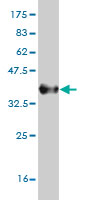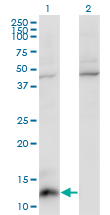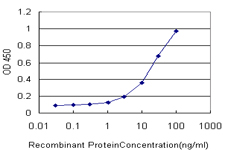CCL7 Antibody (monoclonal) (M03)
Mouse monoclonal antibody raised against a partial recombinant CCL7.
- 产品详情
- 实验流程
- 背景知识
Application
| WB, E |
|---|---|
| Primary Accession | P80098 |
| Other Accession | NM_006273 |
| Reactivity | Human |
| Host | mouse |
| Clonality | monoclonal |
| Isotype | IgG2b Kappa |
| Clone Names | 4B5 |
| Calculated MW | 11200 Da |
| Gene ID | 6354 |
|---|---|
| Other Names | C-C motif chemokine 7, Monocyte chemoattractant protein 3, Monocyte chemotactic protein 3, MCP-3, NC28, Small-inducible cytokine A7, CCL7, MCP3, SCYA6, SCYA7 |
| Target/Specificity | CCL7 (NP_006264, 24 a.a. ~ 99 a.a) partial recombinant protein with GST tag. MW of the GST tag alone is 26 KDa. |
| Dilution | WB~~1:500~1000 E~~N/A |
| Format | Clear, colorless solution in phosphate buffered saline, pH 7.2 . |
| Storage | Store at -20°C or lower. Aliquot to avoid repeated freezing and thawing. |
| Precautions | CCL7 Antibody (monoclonal) (M03) is for research use only and not for use in diagnostic or therapeutic procedures. |
For Research Use Only. Not For Use In Diagnostic Procedures.
Provided below are standard protocols that you may find useful for product applications.
BACKGROUND
This gene encodes monocyte chemotactic protein 3, a secreted chemokine which attracts macrophages during inflammation and metastasis. It is a member of the C-C subfamily of chemokines which are characterized by having two adjacent cysteine residues. The protein is an in vivo substrate of matrix metalloproteinase 2, an enzyme which degrades components of the extracellular matrix. This gene is part of a cluster of C-C chemokine family members on chromosome 17q.
REFERENCES
Evaluation of candidate stromal epithelial cross-talk genes identifies association between risk of serous ovarian cancer and TERT, a cancer susceptibility hot-spot. Johnatty SE, et al. PLoS Genet, 2010 Jul 8. PMID 20628624.Fucosyltransferase 2 (FUT2) non-secretor status is associated with Crohn's disease. McGovern DP, et al. Hum Mol Genet, 2010 Sep 1. PMID 20570966.Interleukin-9 polymorphism in infants with respiratory syncytial virus infection: an opposite effect in boys and girls. Schuurhof A, et al. Pediatr Pulmonol, 2010 Jun. PMID 20503287.Polymorphisms in innate immunity genes and risk of childhood leukemia. Han S, et al. Hum Immunol, 2010 Jul. PMID 20438785.Risk of meningioma and common variation in genes related to innate immunity. Rajaraman P, et al. Cancer Epidemiol Biomarkers Prev, 2010 May. PMID 20406964.
终于等到您。ABCEPTA(百远生物)抗体产品。
点击下方“我要评价 ”按钮提交您的反馈信息,您的反馈和评价是我们最宝贵的财富之一,
我们将在1-3个工作日内处理您的反馈信息。
如有疑问,联系:0512-88856768 tech-china@abcepta.com.























 癌症的基本特征包括细胞增殖、血管生成、迁移、凋亡逃避机制和细胞永生等。找到癌症发生过程中这些通路的关键标记物和对应的抗体用于检测至关重要。
癌症的基本特征包括细胞增殖、血管生成、迁移、凋亡逃避机制和细胞永生等。找到癌症发生过程中这些通路的关键标记物和对应的抗体用于检测至关重要。 为您推荐一个泛素化位点预测神器——泛素化分析工具,可以为您的蛋白的泛素化位点作出预测和评分。
为您推荐一个泛素化位点预测神器——泛素化分析工具,可以为您的蛋白的泛素化位点作出预测和评分。 细胞自噬受体图形绘图工具为你的蛋白的细胞受体结合位点作出预测和评分,识别结合到自噬通路中的蛋白是非常重要的,便于让我们理解自噬在正常生理、病理过程中的作用,如发育、细胞分化、神经退化性疾病、压力条件下、感染和癌症。
细胞自噬受体图形绘图工具为你的蛋白的细胞受体结合位点作出预测和评分,识别结合到自噬通路中的蛋白是非常重要的,便于让我们理解自噬在正常生理、病理过程中的作用,如发育、细胞分化、神经退化性疾病、压力条件下、感染和癌症。








